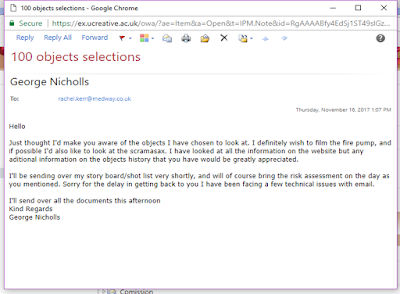Professional Practice: Reading Up
Before I start writing my script I need to make sure I know what I'm talking about and that I am well informed.
Since I had decided to look at the Newsham Fire Pump as my primary focus my next step was to make sure I had confirmed my decision with the Guildhall.
I sent them over an email and used this opportunity to request further information on the object so that I could deliver information effectively to an audience and tell a good story.
As you can see in the above email I contacted Rachel and then Steve asking them to send over any information they had about the fire pump (as they said in the meeting they would be happy to send over anything they had).
I went to them first as since the pump was in their possession I knew they would be well informed.
I also referred to the pictures I took in the museum and re read over its display details to see if I had missed anything.
However I wasn't going to stop there, I wanted to make sure I covered a variety of sources, and the next best place was online.
My first port of call here was to refer back to the 100 objects website as it had multiple segments which had mini articles on the objects history.
This was a very useful source and helped me get a head start on my script, allowing me to plan my shots around the information I had. I changed some of the language used so that it would flow better as a story but made sure to stay factually accurate.
I read up about its condition before it came to the museum which was a key part of the story, I also read the key points that they wanted to be used in schools and was sure to include that in my writing.
All of this helped me to start creating an informative script.
However the objects weren't the only thing I wanted to learn about, I decided to do some research in to the Guildhall museum its self to learn a little bit more about exactly who I was working for.
I started by going over the notes that I took when I was listening to the commission/placement pitches a few weeks ago. I was quite intrigued by this opportunity early on and I heard from previous students that they were good to work for.
According to those who did both the 100 objects and the Young Routes commission last year, they were good to work for. they were interested in the direction that we wanted to go down (as I also found) but ultimately were respectful of creative freedom (provided it matched their agenda).
I also heard that they were quite helpful when it came to filling out paperwork and gave a detailed report.
This is good to know and I can feel safe in teh knowledge that i am working for a reliable company.
My next step was to go online and explore the pages on the Medway Council website about the museum.
It was here that I was able to obtain some key facts about the Museum Its self.
According to the website the building it's self was constructed in the early 17th century dating back a long time like a lot of Rochester. It wasn't always a museum and for a number of years served as a civic building.
This was interesting but what was even more important was its partnership and hosting background.
The museum is described as "by no means quiet" there are often events going on. It hosts interactive learning experiences and sees hundreds of visitors a year, a great many of these visitors being school children.
The museum (and it's 100 objects exhibits) are often in collaboration with local schools where they have them come in to learn and explore the exhibits up close and personal, often with interactive learning tasks. They have an education officer who I met briefly who sends out information to local schools which often includes projects that have been generated through university partnerships like this one.
I also learned that talks are regularly held at the museum that discuss the historic area and often focus on the people or indeed objects that helped shape Kent.
This is really useful information to have since I now realize that I will have a bigger audience than I first expected, and I will need to make sure that my project really brings the history to life so that it can grip a wide audience.





No comments:
Post a Comment